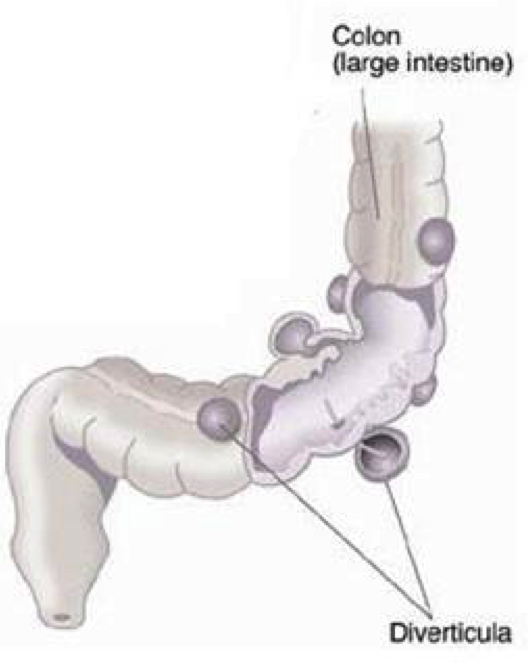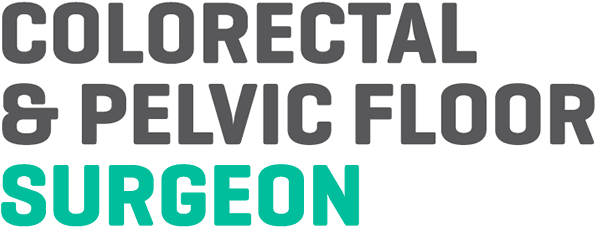Diverticular Disease
Diverticular disease (also known as diverticulosis) is a condition in which small outpouchings (diverticula) develop in parts of the bowel wall. The normal colon is a smooth hollow tube, with a wall made up of three separate layers. However, there can be local areas of weakness in the bowel wall, and in some people the inner bowel lining protrudes through these weak areas, causing diverticular disease.
Diverticula can occur throughout the gastrointestinal tract, which extends from the mouth to the anus. They can occur anywhere in the large bowel, but the most common place they are found is in the left part of the colon known as the sigmoid colon.
Diverticular disease is very common and occurs increasingly with age. It is believed to be present in half of people in their fifties and in three quarters of those in their late seventies. It is also common in people who are prone to constipation. It is thought to be becoming more common in people with a low-fibre diet, especially if diverticular disease is present in other family members. People with connective tissue disorders (causing increased stretchiness of the soft tissues) are also at increased risk of developing diverticula.
Exactly why some people form diverticula and others do not is not known. Some vegetarians on an extremely high-fibre diet have many diverticula and others with an extremely poor diet never form a diverticula during their lifetime. However, with the increasing adoption of a lower-fibre and more processed diet, diverticular disease is becoming more common in younger people and is even seen now in some people in their twenties.
The vast majority of people with diverticular disease do not know they have the condition and have no symptoms whatsoever. However, some people do develop symptoms, which can be very similar to those of irritable bowel syndrome (IBS), to the point that it is often unclear whether it is the diverticular disease or IBS that is causing their symptoms. Typical symptoms include bloating, abdominal discomfort, and diarrhoea or constipation. Some people with the disease report bright red blood coming out when they go to the toilet. Thankfully, people with diverticular disease are at no extra risk of developing bowel cancer.
Some people with diverticular disease develop a condition called diverticulitis. This is when one or more specific diverticula become inflamed or infected. Diverticulitis is associated with a temperature, abnormal blood tests, and a computed tomography (CT) scan showing changes of infection around the affected diverticulum. No one is quite sure, but it seems that 10%–25% of people with diverticular disease will develop diverticulitis.

Diagnosis
Diverticular disease can be found by chance in people with no symptoms whatsoever during any type of large bowel investigation. Most commonly, these investigations will be colonoscopy or CT colonography. Without these tests, the diagnosis cannot be confirmed. Likewise with diverticulitis, a CT scan is needed to make the diagnosis.
The symptoms of diverticular disease and those of bowel cancer can be very similar and sometimes colonoscopy or CT colonography cannot look at the affected area accurately because of the large number of diverticula present. Therefore, surgery is sometimes recommended to make sure a bowel cancer is not missed.
Treatment
The treatment of diverticular disease depends mainly on its symptoms. If severe IBS-type symptoms are associated with diverticular disease, these will be managed just as they would be for IBS. Studies have shown that surgery does not improve the IBS-type symptoms associated with diverticular disease, so treatment is non-surgical in these cases.
Unfortunately, once diverticula have formed they will never go away, although we may slow their progression by improving the amount of fibre and fluid in the diet if this has been poor in the past.
Sometimes people with diverticular disease need to be admitted to hospital as an emergency, usually because they have developed diverticulitis and an abscess next to the bowel. This may need to be drained by X-ray techniques and treated with antibiotics. Occasionally the bowel wall can become perforated at the site of an inflamed diverticulum, and this also requires emergency surgery (usually in the form of a partial colectomy).
Some patients develop abnormal connections between their diverticula and the bladder (a colovesical fistula) or the vagina (a colovaginal fistula), allowing the bowel contents to spill into these organs. These patients need a surgical repair on a planned (elective) basis. Elective surgery is also needed for diverticular disease if there is a narrowing (stricture) in the bowel.
For more information on diverticular disease, please visit http://patient.info/health/diverticula-including-diverticulosis-diverticular-disease-and-diverticulitis

